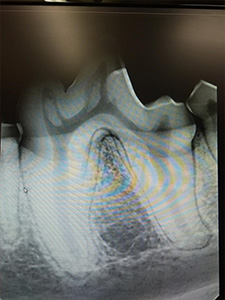Dental hygiene is very important to your pet’s overall health. By the age of two, 80% of dogs and 70% of cats have some form of periodontal disease; 10% of dogs have a broken tooth with nerve or root exposure.
Many people seem to just expect their pet to have bad breath, but halitosis (bad breath) is actually a symptom of dental disease. Other symptoms include: a reluctance to chew; increased salivation; red, puffy, bleeding gums; tartar resulting from plaque build-up, and missing or loose teeth. The most important thing to do is address dental disease as soon as it is detected.
At our Kentville hospital we perform dental procedures daily for dogs, cats and some exotic pets. Commonly performed dental services include scaling and polishing (hygiene/cleaning) of teeth. During the examination the veterinarian may discover loose or diseased teeth that require extraction. Anesthesia is necessary to do these procedures properly and humanely. The new standard is to do full mouth dental X-rays for every dentistry patient as X-rays can detect tooth root problems, abscesses, jaw abnormalities, and other issues that may not be able to be seen above the gums.
For additional support we have some wonderful foods for your pets that will help to control tarter build-up. New to the market is a daily dental care concentrate that you simply add to your pet’s water.
We also perform teeth trimming in rodents and beak trimming in pet birds. Anesthesia is usually not necessary for these procedures.

